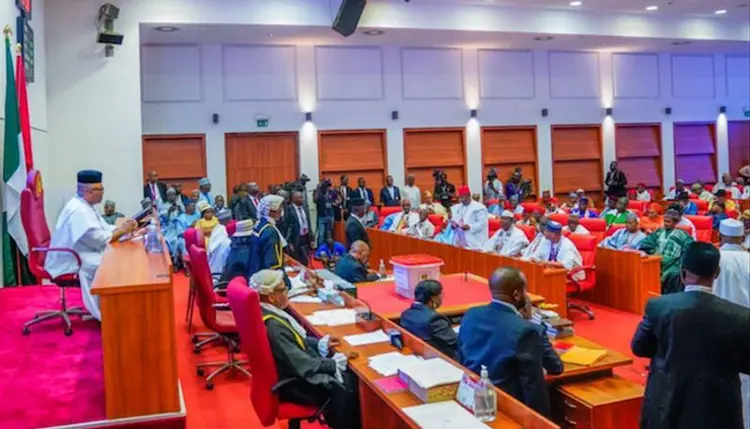The Senate on Tuesday intensified calls for a decisive overhaul of Nigeria’s security architecture, urging President Bola Tinubu to immediately authorise the recruitment of 100,000 additional military personnel to confront worsening insurgency, banditry, and the renewed wave of school abductions.
This followed the recent attack on Government Girls School, Maga, in Kebbi State, where gunmen killed the vice principal and reportedly abducted 25 students. The incident sparked outrage among lawmakers, prompting demands for accountability and urgent reforms.
The motion gained momentum after additional prayers by Senator Adams Oshiomhole (Edo North), sparking a heated debate over rising insecurity across the country. Senate President Godswill Akpabio presided over the session before moving lawmakers into a closed-door meeting to discuss classified intelligence.
Speaking during plenary, Oshiomhole warned that Nigeria’s security crisis required a significant expansion of the armed forces.
“I urge the President and the armed forces to recruit an additional 100,000 military personnel so we can have enough men and women in our troops. It is also another way to create employment for our youthful population,” he said.
He also criticised the alleged commercialisation of national security and demanded transparency regarding the Safe School Programme.
“People have turned our security into a business. We should not monetise the death of our people. What happened to the money earmarked for the Safe School programme?”
The Senate unanimously adopted his call for a full investigation into how funds allocated to the initiative have been spent. Lawmakers questioned why attacks on schools persist despite significant financial commitments.
Akpabio endorsed the proposal, lamenting that criminals increasingly target vulnerable institutions.
“We urge the Federal Government and Senate Committee to probe the spending. Unfortunately, these criminals are going after soft targets,” he said.
He cautioned against politicising insecurity and offered condolences for the lives lost in the Maga attack.
“All lives matter. May the souls of our fellow Nigerians and the vice principal who died protecting students rest in peace.”
READ ALSO: Shettima to visit Kebbi over kidnapped schoolgirls, condole victims’ families
N144.7bn earmarked for safe school initiative
Documents obtained by New Daily Prime show that the Federal Government allocated N144.7bn to the Safe School Initiative between 2023 and 2026. Of this amount, N82.9bn was designated for security agencies to purchase equipment, strengthen operations, and train personnel.
Yearly allocations include N32.5bn in 2023, N36.9bn in 2024, N37.1bn in 2025, and N38bn in 2026. The Nigeria Security and Civil Defence Corps, the Defence Headquarters, the police, and the Department of State Services all received substantial budgetary provisions under the plan.
The initiative, launched in 2014 after the Chibok abductions, aims to secure schools through a mix of community protection, early-warning systems, and targeted interventions in high-risk areas. Yet the recent kidnapping of 25 students in Kebbi has cast renewed doubt on its effectiveness.
11,550 schools registered so far
Assistant Commandant General Emmanuel Ocheja, Commander of the National Safe Schools Response and Coordination Centre, said 11,550 schools have been registered on the central monitoring platform. He stressed that while progress is being made, sustainable funding remains essential.
“Funding for the safety of our children in schools should be a major concern for partners and well-meaning individuals,” he said. He added that ongoing technological upgrades—including surveillance drones and advanced command centres—require significant investment.
Ocheja highlighted the need for enhanced early-warning systems, increased state participation, and the training of school guards and vigilantes.
“They will be our foot soldiers and informants, and all of this will require funding,” he added.
As Nigeria grapples with escalating security threats, the Senate’s latest resolutions signal mounting political pressure on the Federal Government to rethink its strategy and strengthen school protection nationwide.



